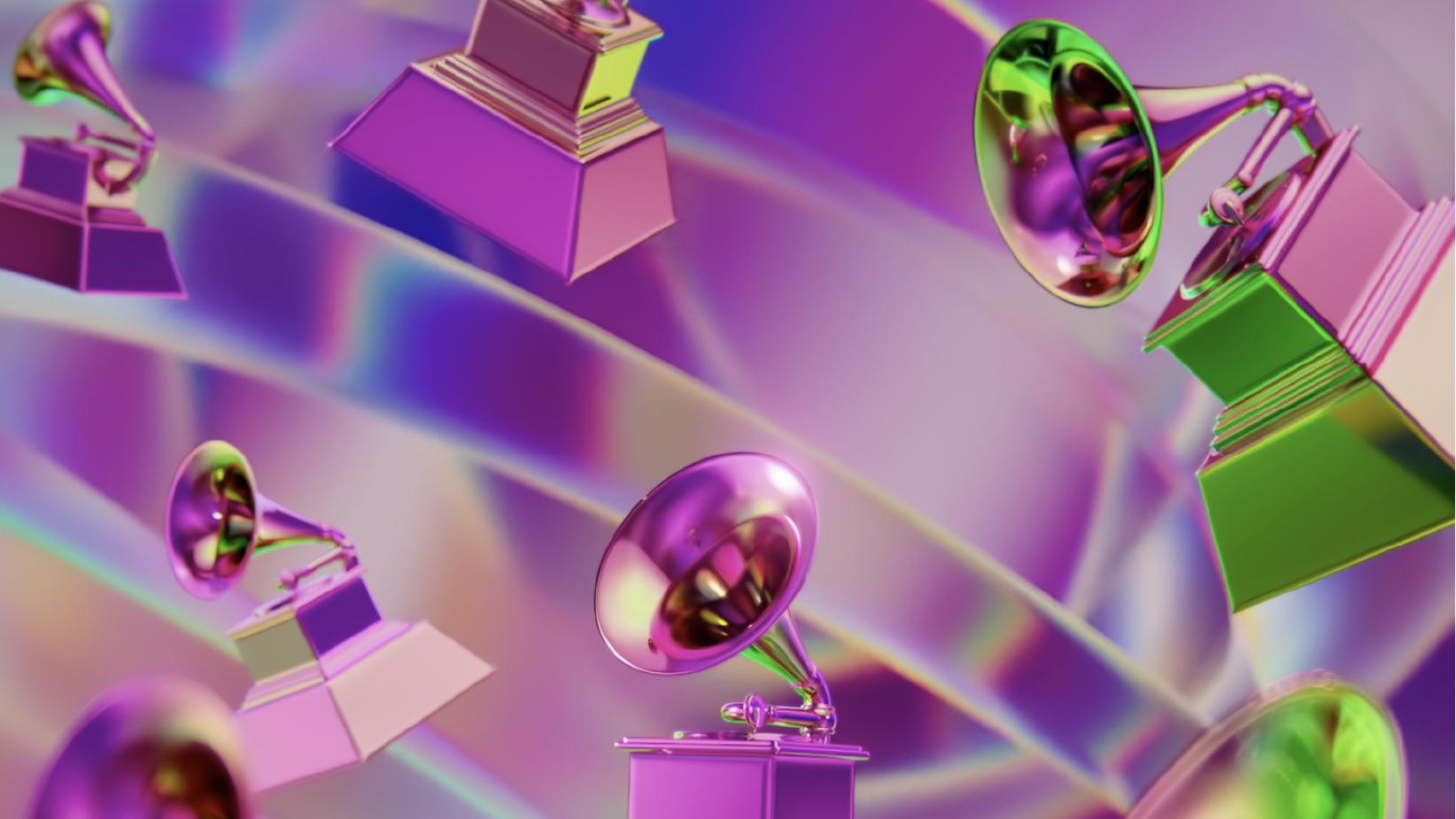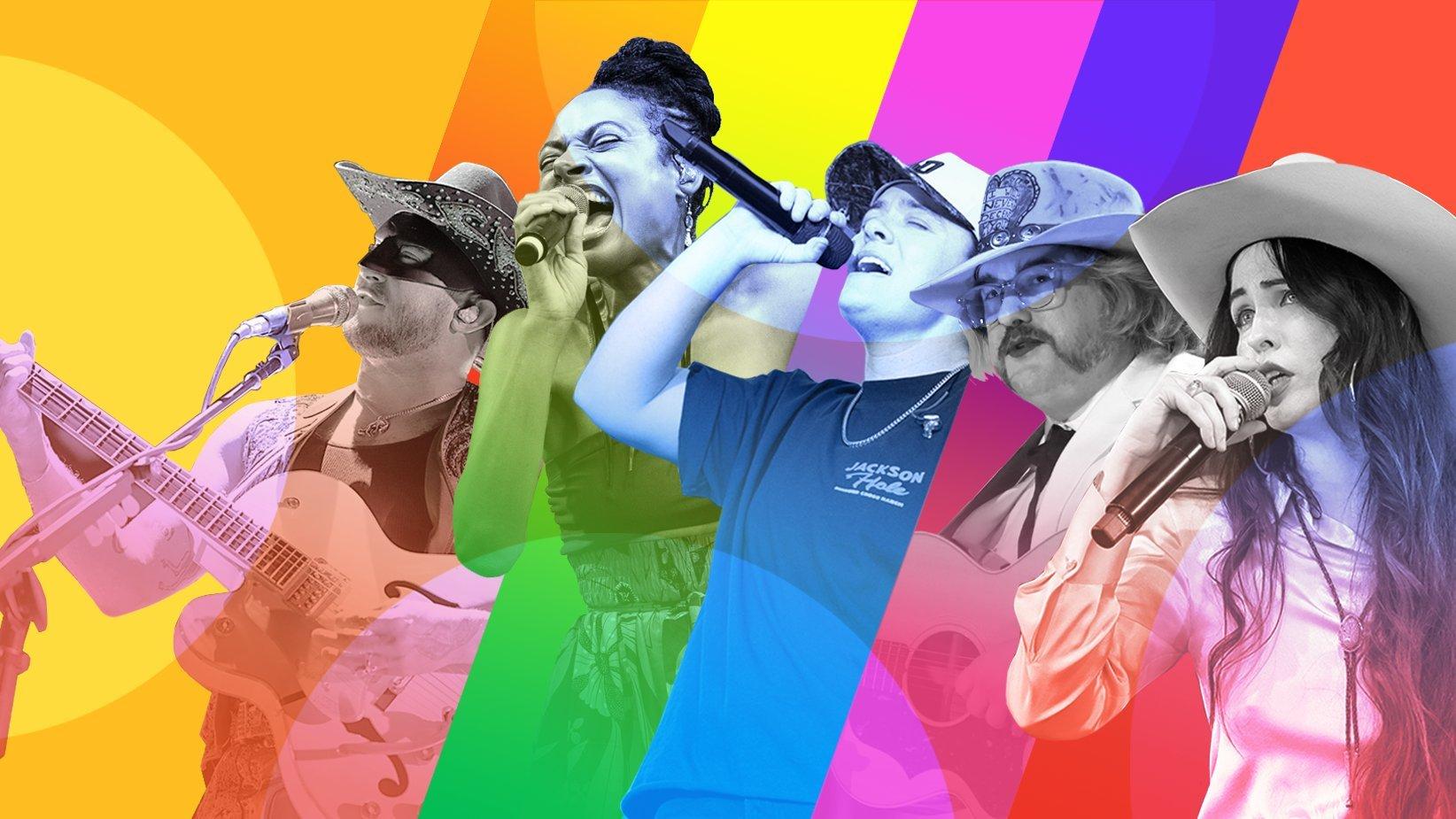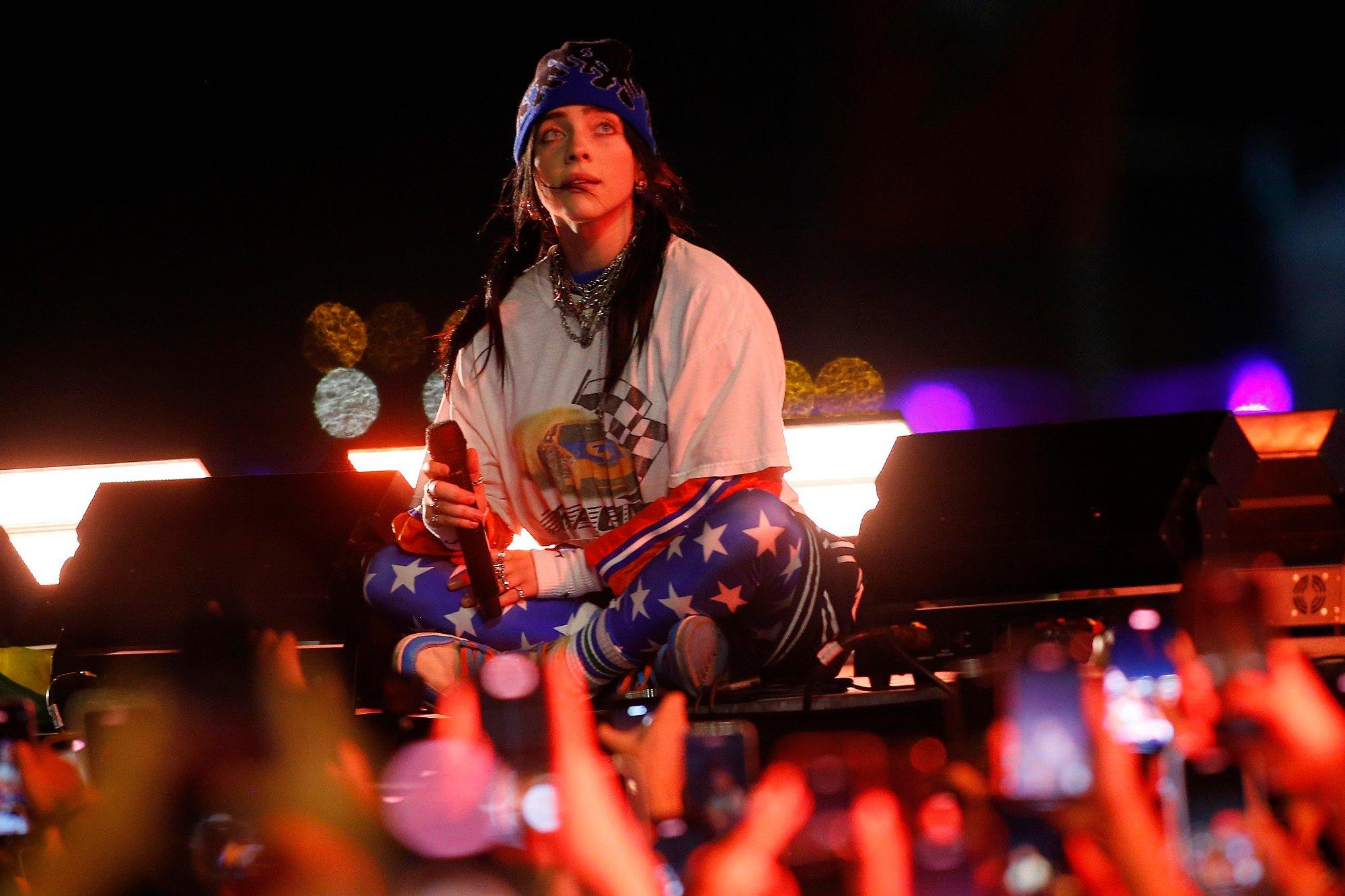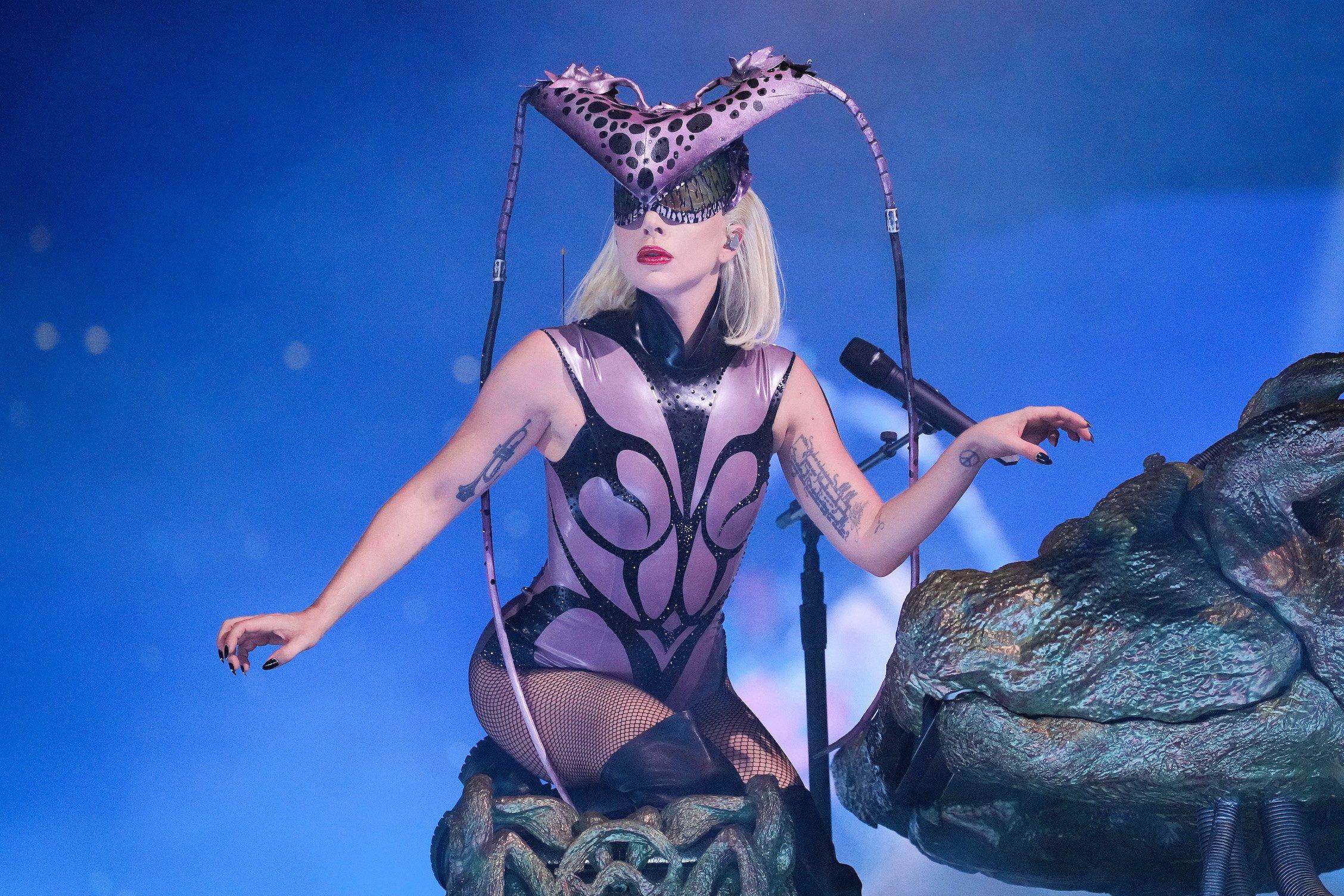Editor's Note: The 2022 GRAMMYs Awards show, officially known as the 64th GRAMMY Awards, has been rescheduled to Sunday, April 3, at the MGM Grand Garden Arena in Las Vegas. The below article was updated on Tuesday, Jan. 18, to reflect the new show date and location.
Right off the bat, 2021 showed promise for another year of massive hits with unforgettable hooks thanks to Olivia Rodrigo's record-breaking smash "driver's license."
Less than two months later, Anderson .Paak and Record Of The Year veteran Bruno Mars kicked off the Silk Sonicera with the instantly memorable jam "Leave the Door Open." In the months that followed, Billie Eilish struck again with her sophomore album, Doja Cat and SZA teamed up for one hell of an earworm, and both Lil Nas X and ABBA shook the world (for very different reasons).
Suffice to say, the race for Record Of The Year — which is awarded to the artist and the producer(s), recording engineer(s) and/or mixer(s) and mastering engineer(s) — is going to be a tight one at the 2022 GRAMMY Awards show.
With ABBA, Jon Batiste, Tony Bennett and Lady Gaga, Brandi Carlile, Lil Nas X, Billie Eilish, Doja Cat and SZA, Olivia Rodrigo, Silk Sonic, and Justin Bieber, Daniel Caesar and Giveon delivering equally impactful tunes, it's really anyone's to win.
Before tuning into the show on April 3, 2022, get fully acquainted with this year's ROTY nominees below.
Nominations for the 2022 GRAMMYs Awards show are officially here! See the full list of nominations.
ABBA — "I Still Have Faith in You"
<style>.embed-container { position: relative; padding-bottom: 56.25%; height: 0; overflow: hidden; max-width: 100%; } .embed-container iframe, .embed-container object, .embed-container embed { position: absolute; top: 0; left: 0; width: 100%; height: 100%; }</style><div class='embed-container'><iframe src='https://www.youtube.com/embed/pAzEY1MfXrQ' frameborder='0' allowfullscreen></iframe></div>
ABBA sent the world into a frenzy upon their much-anticipated return in September, when they released the first two songs from Voyage, their first album in 40 years.
"I Still Have Faith In You," a heartfelt ode to their friendships that have endured throughout their time apart, is a song that the group wrote in 2018 along with its partner single, "Don't Shut Me Down."
"New spirit has arrived/ The joy and the sorrow/ We have a story and it survived," the Swedish superstars sing on the chorus over a majestic rhythm, building to a series of dazzling harmonies for the song's epic finish. It's a musical odyssey that is oh-so-classic ABBA.
Believe it or not, this nomination marks ABBA's first GRAMMY nomination in their career. ("Dancing Queen," however, was inducted into the Recording Academy's Grammy Hall of Fame in 2015.)
Considering that the group's Agnetha Fältskog has suggested that this album (and forthcoming tour) might be their last, there will likely be many fans glued to their TV to find out if ABBA get to call themselves GRAMMY winners.
Jon Batiste — "FREEDOM"
<style>.embed-container { position: relative; padding-bottom: 56.25%; height: 0; overflow: hidden; max-width: 100%; } .embed-container iframe, .embed-container object, .embed-container embed { position: absolute; top: 0; left: 0; width: 100%; height: 100%; }</style><div class='embed-container'><iframe src='https://www.youtube.com/embed/3YHVC1DcHmo' frameborder='0' allowfullscreen></iframe></div>
In an era where more and more artists are advocating acceptance, New Orleans musician Jon Batiste brought a big-band flair to an important message.
Backed by jazzy instrumentation and a snappy beat, "FREEDOM" is an anthem for simply feeling good and feeling free. "Free to live (How I wanna live)/ I'm gon' get (What I'm gonna get)/ 'Cause it's my freedom," Batiste proclaims in the chorus.
The three-time GRAMMY nominee encapsulated the culture and energy of his hometown in three uplifting minutes, his soulful and impassioned voice bringing listeners on a joyful journey of celebrating themselves.
Ultimately, "FREEDOM" is lyrically and melodically what today's sociopolitical climate needs.
Read More: Jon Batiste Talks New Album We Are, His Brain-Breaking Itinerary & Achieving "Freedom" From Genre
Tony Bennett & Lady Gaga — "I Get a Kick Out Of You"
<style>.embed-container { position: relative; padding-bottom: 56.25%; height: 0; overflow: hidden; max-width: 100%; } .embed-container iframe, .embed-container object, .embed-container embed { position: absolute; top: 0; left: 0; width: 100%; height: 100%; }</style><div class='embed-container'><iframe src='https://www.youtube.com/embed/iTdHQ065A_o' frameborder='0' allowfullscreen></iframe></div>
Who would've ever thought that a song first sung in 1934 would be nominated for a GRAMMY — let alone the coveted Record of the Year — in 2021?
Lady Gaga and Tony Bennett made that possible with their take on the classic "I Get a Kick Out of You," the lead single from Love for Sale, the duo's second collaborative album of jazz standards by composer Cole Porter.
Their adoring, decade-long friendship is apparent on the lively track, which builds from a mellow piano beginning into full jazz and swing orchestration by the song's end.
Between the two of them, Gaga and Bennett have 30 GRAMMYs (12 and 18, respectively). Yet, taking home Record of the Year would mark a special moment for the pair, as Gaga has never won the award and Bennett's last ROTY win was in 1963.
What's more, Love for Sale is said to be Bennett's last album, as the 95-year-old was diagnosed with Alzheimer's disease in 2016, just before he and Gaga began recording the LP.
Take A Look Back: For The Record: The Liberating Joy Of Lady Gaga's Born This Way At 10
Justin Bieber Featuring Daniel Caesar & Giveon — "Peaches"
<style>.embed-container { position: relative; padding-bottom: 56.25%; height: 0; overflow: hidden; max-width: 100%; } .embed-container iframe, .embed-container object, .embed-container embed { position: absolute; top: 0; left: 0; width: 100%; height: 100%; }</style><div class='embed-container'><iframe src='https://www.youtube.com/embed/tQ0yjYUFKAE' frameborder='0' allowfullscreen></iframe></div>
Just one year after Justin Bieber released his R&B-tinged LP, Changes, he unveiled what would become his biggest R&B hit to date, "Peaches."
The suave track, which features R&B stars Daniel Caesar and Giveon, incorporates swirling production and a wavy melody, creating a perfect soundtrack for a windows-down cruise.
The fifth single from Bieber's sixth studio album, Justice, "Peaches" has been highly praised as an album standout. The stats prove it: With nearly 1 billion streams on Spotify alone, the song gave Bieber his eighth Hot 100 No. 1 (and his only No. 1 from Justice).
But the achievement that may be Bieber's proudest is notching a No. 1 on Hot R&B/Hip-Hop Songs, a feat he couldn't quite manage with last year's GRAMMY-nominated "Yummy."
It also marks his first Record of the Year nomination as the lead artist (he received a nod for his role on Luis Fonsiand Daddy Yankee's "Despacito" in 2017), making "Peaches" a true career highlight for the Biebs.
Read More: The 64th GRAMMY Awards: Everything You Need To Know About The 2022 GRAMMYs Awards Show & Nominations
Brandi Carlile — "Right On Time"
<style>.embed-container { position: relative; padding-bottom: 56.25%; height: 0; overflow: hidden; max-width: 100%; } .embed-container iframe, .embed-container object, .embed-container embed { position: absolute; top: 0; left: 0; width: 100%; height: 100%; }</style><div class='embed-container'><iframe src='https://www.youtube.com/embed/tOpWqWK0q4U' frameborder='0' allowfullscreen></iframe></div>
Another timely tune, Brandi Carlile's "Right On Time" is a commentary on the impact of the COVID-19 pandemic, reflecting on conflict and regret.
The piano-laced ballad put Carlile's powerful vocals at the forefront, particularly on the dynamic chorus that's reminiscent of the singer's previous ROTY nominee, 2017's "The Joke." Perhaps that's because Carlile herself has said she believes in "Right On Time" as much as she did "The Joke," something she has been waiting to feel for years.
In an interview with Entertainment Weekly, the singer/songwriter expounded on the song's meaning: "There's something really human about the obstacles that we've put in front of ourselves, and then deciding to just somehow explode through it and say, maybe I didn't come out of this right, maybe I didn't handle this the right way, maybe it wasn't right, but something had to happen — so it was right on time."
GRAMMY Flashback: Backstage At The 63rd GRAMMYs: Brandi Carlile Praises The "Artistic Threads That Chain Us All Together" Ahead Of Music’s Biggest Night
Doja Cat feat. SZA — "Kiss Me More"
<style>.embed-container { position: relative; padding-bottom: 56.25%; height: 0; overflow: hidden; max-width: 100%; } .embed-container iframe, .embed-container object, .embed-container embed { position: absolute; top: 0; left: 0; width: 100%; height: 100%; }</style><div class='embed-container'><iframe src='https://www.youtube.com/embed/0EVVKs6DQLo' frameborder='0' allowfullscreen></iframe></div>
If the hook of "Kiss Me More" sounds familiar, try listening to Olivia Newton-John's 1981 hit "Physical."
Doja Cat and SZA's bouncy collab brilliantly interpolates the single, but swelling production and a punchy beat make "Kiss Me More" anything but a cheap ripoff. The lead single from Doja Cat's highly acclaimed third album Planet Her, the track spotlights the star's prowess as both a singer and a rapper, bringing in SZA for a flawless match-up of female power.
The song's rolling melody made it an instant radio hit (and, in turn, inescapable), earning Doja Cat her second No. 1 at pop radio and SZA her first.
It reached No. 3 on the Billboard Hot 100, where it became the longest-running all-female top 10 hit in the chart's history, surpassing Brandy and Monica's GRAMMY-winning 1998 duet "The Boy Is Mine."
Read More: From Meme Queen To Popstar: Revisiting Doja Cat's Inevitable Breakout
Billie Eilish — "Happier Than Ever"
<style>.embed-container { position: relative; padding-bottom: 56.25%; height: 0; overflow: hidden; max-width: 100%; } .embed-container iframe, .embed-container object, .embed-container embed { position: absolute; top: 0; left: 0; width: 100%; height: 100%; }</style><div class='embed-container'><iframe src='https://www.youtube.com/embed/5GJWxDKyk3A' frameborder='0' allowfullscreen></iframe></div>
After two back-to-back Record of the Year wins, Billie Eilish strikes again with "Happier Than Ever."
The five-minute track is essentially two songs in one: The first half focuses on Eilish's softer register as she begins to tear into everything that was wrong in a past relationship ("When I'm away from you/ I'm happier than ever," she declares in the chorus); the second part elevates into a gritty guitar-driven, cathartic tell-off as Eilish demands at the song's finish, "Just f–kin leave me alone."
Eilish calls "Happier Than Ever," the titular track from her sophomore album, "probably the most therapeutic song I've ever written or recorded, like ever, ever, ever, 'cause I just screamed my lungs out," according to Genius.
But like much of Eilish's catalog, she presents that therapy session with a captivating melodic ride that keeps listeners hanging on with every word.
It's an amalgamation of everything Eilish has brought to the table in her whirlwind career thus far: haunting vocals, raw lyrics and a mosh-pit-worthy finale.
Read More: Billie Eilish's Road To Happier Than Ever: How The Superstar Continues To Break Pop's Status Quo
Lil Nas X — "MONTERO (Call Me By Your Name)"
<style>.embed-container { position: relative; padding-bottom: 56.25%; height: 0; overflow: hidden; max-width: 100%; } .embed-container iframe, .embed-container object, .embed-container embed { position: absolute; top: 0; left: 0; width: 100%; height: 100%; }</style><div class='embed-container'><iframe src='https://www.youtube.com/embed/6swmTBVI83k' frameborder='0' allowfullscreen></iframe></div>
It's hard to imagine that Lil Nas X could make a song more ubiquitous than 2019's "Old Town Road," but he put a solid player in the ring with "MONTERO (Call Me By Your Name)."
The track became the talk of the industry upon the release of its controversial video, which featured raunchy scenes with the devil himself (yes, you read that right).
But beyond the shock factor, "MONTERO" played an important role in Lil Nas X's career, as it was his first official single to address his sexuality since he publicly came out as gay in 2019 ("C7osure [You Like]" from his debut EP, 7,touched on it, but was not released as a single).
It also ushered in a new sound for the rapper, leaning more into hip-hop and trap and eliminating any country influence he brought with his first project.
The pivot worked: "MONTERO" debuted atop the Hot 100, earning Lil Nas X his second No. 1. The song has more than 1 billion streams on Spotify — and though that's only half of the stream count for "Old Town Road," "MONTERO" ultimately proved that Lil Nas was no one-hit wonder.
Take A Look Back: Lil Nas X, BTS & Billy Ray Cyrus Enter The "Old Town Road" Multiverse At The 2020 GRAMMYs
"driver's license" — Olivia Rodrigo
<style>.embed-container { position: relative; padding-bottom: 56.25%; height: 0; overflow: hidden; max-width: 100%; } .embed-container iframe, .embed-container object, .embed-container embed { position: absolute; top: 0; left: 0; width: 100%; height: 100%; }</style><div class='embed-container'><iframe src='https://www.youtube.com/embed/ZmDBbnmKpqQ' frameborder='0' allowfullscreen></iframe></div>
Whether you're 16 or 65, Olivia Rodrigo tugged at your heartstrings this year with her anthemic power ballad of teenage heartbreak, "driver's license."
The piano-driven smash first gained traction when Rodrigo teased a snippet on social media last year, resulting in an almost unbelievable debut for the then 17-year-old upon its January release.
The song broke the Spotify record for the most single-day streams for a non-holiday song, subsequently debuting at No. 1 on the Billboard Hot 100, where it stayed for eight consecutive weeks — earning Rodrigo the title of the youngest artist to debut atop the chart as well as the longest-running number-one debut.
Starting off with an apropos car engine start (a sound that seamlessly flows into the song's plinking piano), "driver's license" allows Rodrigo's tender voice to shine before she lets out howls of heartbreak on the chorus.
The narrative becomes a full-on sing-along at the song's climax, a bridge you can't help but belt out.
With so many layers and infectious hooks, the single became such a phenomenon that it even got its own sketch on "Saturday Night Live." Therein, one character summed it up perfectly: "If Olivia taught us anything, it's that pain can be creatively generative."
"Leave the Door Open" — Silk Sonic
<style>.embed-container { position: relative; padding-bottom: 56.25%; height: 0; overflow: hidden; max-width: 100%; } .embed-container iframe, .embed-container object, .embed-container embed { position: absolute; top: 0; left: 0; width: 100%; height: 100%; }</style><div class='embed-container'><iframe src='https://www.youtube.com/embed/adLGHcj_fmA' frameborder='0' allowfullscreen></iframe></div>
A week after Bruno Mars and Anderson .Paak announced that they were joining forces for a superduo back in February, the pair — together, named Silk Sonic — released their first single, "Leave the Door Open."
And it did not disappoint: The sensual track calls back to the '70s funk and soul music that inspires both singers (after all, Bootsy Collins did bestow them their name), with twinkling instrumentation and a finger-snapping beat that immediately gets you tapping your toes.
The tune showcases each of their vocal specialties in masterful form, also incorporating their knack for lyrics as smooth as they are cheeky (for one, "And if you're hungry, girl, I got filets").
While Mars is no stranger to No. 1s, "Leave the Door Open" gave Anderson his first No. 1 on the Hot 100, Hot R&B/Hip-Hop Songs, and Rhythmic Airplay.
If the song takes home Record of the Year, it'll be the four-time GRAMMY winner's first ROTY win, and the 11-time winning Mars' third.
2022 GRAMMYs Awards Show: Complete Nominations List

























